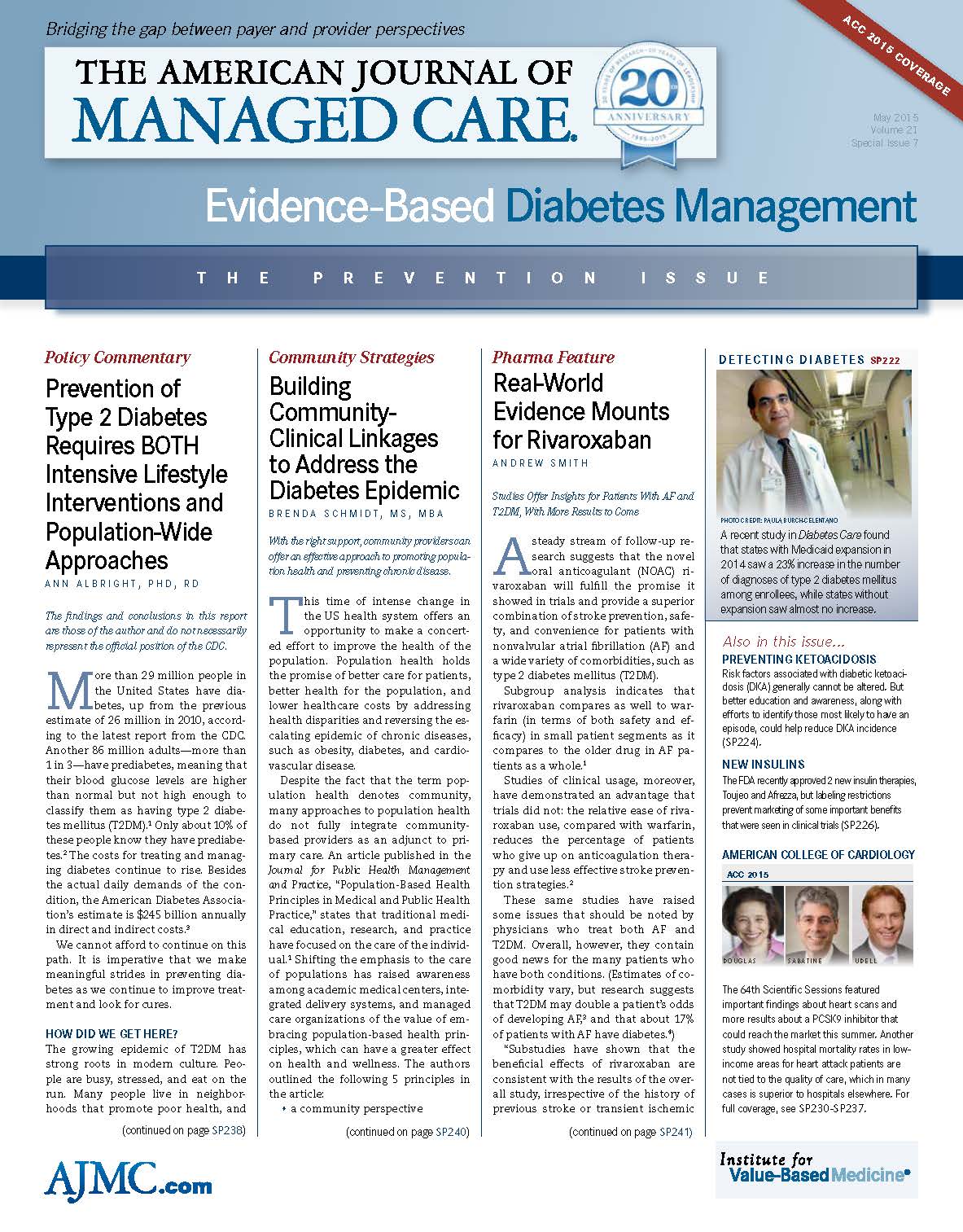- Center on Health Equity & Access
- Clinical
- Health Care Cost
- Health Care Delivery
- Insurance
- Policy
- Technology
- Value-Based Care
At Joslin, We're Ready to Welcome the ADA to Boston
The editor in chief of Evidence-Based Diabetes Management welcomes those coming to the ADA Scientific Sessions to attend sessions featuring faculty from Joslin Diabetes Center.
Our mission at Joslin Diabetes Center calls for sharing what we learn about treating diabetes, and typically our faculty does that by traveling to meetings across the country and all around the world. This year, however, we look forward to the diabetes community coming to our doorstep, when Boston hosts the American Diabetes Association’s (ADA’s) 75th Scientific Sessions June 5-9, 2015.
This opportunity will allow faculty and fellows from Joslin to take part in more than 50 presentations, including 31 post-ers and 14 oral presentations. We are very excited to announce that the ADA is presenting awards to 3 of our faculty members. One of the recipients is Lori Laffel, MD, MPH, chief of the Section on Pediatric, Adolescent and Young Adult Diabetes at Joslin, who will receive the 2015 Outstanding Physician Clinician Award. This is one of the ADA’s highest awards, presented annually to an indi-vidual who is actively involved in the clinical care of patients with diabetes. Dr Laffel is the third Joslin recipient to receive this award. One of the other recipients is George L. King, MD, chief scientific officer at Joslin, who will receive the 2015 Edwin Bierman Award for his exceptional achievements in the field of diabetes-related macrovascular complications and related risk factors.
Two of our faculty will chair panels: Gordon C. Weir, MD, head of Section on Is-let Cell and Regenerative Biology at Joslin, will lead a discussion titled “Transplantation at the Bench.” And Laurie Goodyear, PhD, head of the section on Integrative Physiology and Metabolism at Joslin, will chair the panel, “Effects of Exercise on Non-Muscle Targets.”
I am excited about the diversity of our oral presentations this year. A look at the schedule reveals the breadth of Joslin’s work in the basic science of diabetes, from our increased understanding of the role of genetics, to insulin regulation, to the origins of diabetes at its earliest stages. We are also doing critical work in discovering how diabetes affects long-term health, and we are learning how we, as physicians, can engage our patients to change their behaviors by giving them the opportunity to lead longer, healthier lives.
My presentations at the ADA will be of interest to those who are following the national movement away from fee-for-service and toward a fee-for-value model, with a particular focus on patientcentered diabetes care. I will be leading the Clinical Endocrinology, Health Care Delivery and Public Health Interest Group in an engaging discussion around “Innovative Diabetes Care Delivery Models.” In addition, I will be taking part in a symposium titled “Population Management— Coordinating High-Value Diabetes Care in Diverse Settings,” in which I will speak on state-based initiatives. These sessions should be of great interest to you and your colleagues.
Other highlights include Dr Goodyear’s presentation, “Browning of Fat and Insulin Action.” This is an area that holds promise in the development of new targets for weight management. Osama Hamdy, MD, PhD, medical director of our Obesity Clinical Program at Joslin, will present on his abstract titled “The Long-term Effects of Intensive Lifestyle Intervention on Car-diovascular Risk Factors in Patients with Diabetes in a Real World Clinical Practice: a 5-Year Longitudinal Study.” This abstract was selected to receive the Michaela Modan Memorial Award and was chosen from the top abstracts submitted to the ADA in the areas of human studies on the epidemiology, complications, and prevention of diabetes.
Our researchers continue to focus on identifying a diabetes cure, and 2 faculty from the Section on Islet Cell and Regenerative Biology will give talks on promis-ing approaches to beta cell therapy that utilize Joslin’s unique reset, regulate, and regenerate approach. These researchers include Mary R. Loeken, PhD, investigator in the section on Islet Cell Biology and Regenerative Medicine at Joslin, Erc-ument Dirice, PhD, research fellow in the section on Islet Cell and Regenerative Bi-ology at Joslin, and others.
Representing Joslin from the Section on Vascular Cell Biology are investigator Jennifer K. Sun, MD, MPH, who will dis-cuss “Strengthening Our Defense Against Diabetic Retinopathy,” and Qian Li, MD, PhD, postdoctoral fellow at Joslin, who will share the result of, “Differential Outcomes of Restenosis and Atherosclerosis in Mice with Deletion of Insulin Recep-tors in Vascular Smooth Muscle Cells.”
From Genetics and Epidemiology, Jan Skupien, MD, research fellow at Joslin, will give a talk based on longterm kidney studies at Joslin: “Interaction between Genetic Variants and Glycemic Control in the Pathogenesis of Renal Decline in Type 1 Diabetes Patients from the Joslin Proteinuria Cohort.” Stephan Kissler, PhD, assistant investigator in the section of Im-munobiology at Joslin, will offer insights in his lecture “High-Throughput Functional Validation of Genetic Findings.”
Medha N. Munshi, MD, director of the Geriatrics Program at Joslin, will discuss how diabetes affects some of our seniors in her presentation, “Is Life Significantly Worse for Patients with Comorbid Diabetes and Dementia?”
Of course, the best way to hear these wonderful talks is to come to Boston. If you haven’t registered, there’s still time. Online registration closes May 28, 2015. To learn more, visit http://professional.diabetes.org/Congress_Display. aspx?TYP=9&CID=95010. We hope to see you there!


